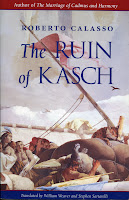Ruby and Ada had been informed about "the shootout" by the Georgia boy who was hidden away in the bushes when the Guard shot the two musicians. Ruby is determined to bury them near where they died.
The journey up to the spot is punctuated by Ada's meditations. At one point as they follow an icy creek, she remembers her father and thinks he "would have made a lesson of such a thing."
He would have said what the match of that creek's parts would be in a person's life, what God intended it to be the type of. All God's works but elaborate analogy. Every bright image in the visible world only a shadow of a divine thing, so that earth and heaven, low and high, strangely agreed in form and meaning because they were in fact congruent.She remembers that he had a book "wherein you could look up the types, but with her new-found connection with life, she
. . . refused to believe that a book could say just how it [creek, or anything in life] should be construed or to what use it might be put. Whatever a book said would lack something essential and be as useless by itself as the gudgeon to a door hinge with no pintle.(For anyone needing an visual, the "pintle" is the pin on the bottom and the "gudgeon" is what it slides into.)

In other words, the world of books lacks "something essential" and is "useless" without a true sense of the real world. The real world isn't a pale companion of the ideal world. If anything, the reverse is true.
As she and Ruby camp under a rock formation for the night, Ada thinks, "This would do . . .Though others might view it as an utterly bare haven, it matched her needs so much that she could just move in and live there."
Ada also finds herself considering one of Stobrod's fiddle tunes.
She had noted it for the oddity of its lyric and for Stobrod's singing, which had been of an intensity that Ada could only assume represented deep personal expression. It took as subject the imagined behavior of its speaker, what he would do had he the power to become one of a variety of brute creature.Earlier, as we know, Inman has imagined himself to be a crow. But Ada focuses on Stobrod's image of a "mole in the ground --- root a mountain down."
The animals seemed wonderful and horrible in their desires, especially the mole, a little powerless hermit blind thing propelled by a lonesomeness and resentment to bring the world falling around him. More wonderful and horrible still was the human voice speaking the song's words, wishing away its humanity to ease the pain inflicted by lost love, love betrayed, love left unexpressed, wasted love.When Ada asks Ruby about the song, if she "thought Stobrod had written the song," we get some of Ruby's mystical skepticism:
A song went round from fiddler to fiddler and each one added something and took something away so that in time the song became a different thing from what it had been, barely recognizable in either tune or lyric. But you could not say the song had been improved, for as was true of all human effort, there was never advancement. Everything added meant something lost, and about as often as not the thing lost was preferable to the thing gained, so that over time we'd be lucky if we just broke even. Anything otherwise was empty pride.You wonder if Ruby isn't speaking for Frazier himself in this passage. As with songs, so with people. For all the life events that we go through, "something is added and something is taken away from" us. All we can hope for, if we're lucky, is that the losing doesn't outstrip the gaining.
There is a famous T.S. Eliot phrase from his poem "The Dry Salvages" that I'll end this entry with because it expresses the connection between songs (music) and human beings. [The italics are mine.]
For most of us, there is only the unattended
Moment, the moment in and out of time,
The distraction fit, lost in a shaft of sunlight,
The wild thyme unseen, or the winter lightning
Or the waterfall, or music heard so deeply
That it is not heard at all, but you are the music
While the music lasts. These are only hints and guesses,
Hints followed by guesses; and the rest
Is prayer, observance, discipline, thought and action.

